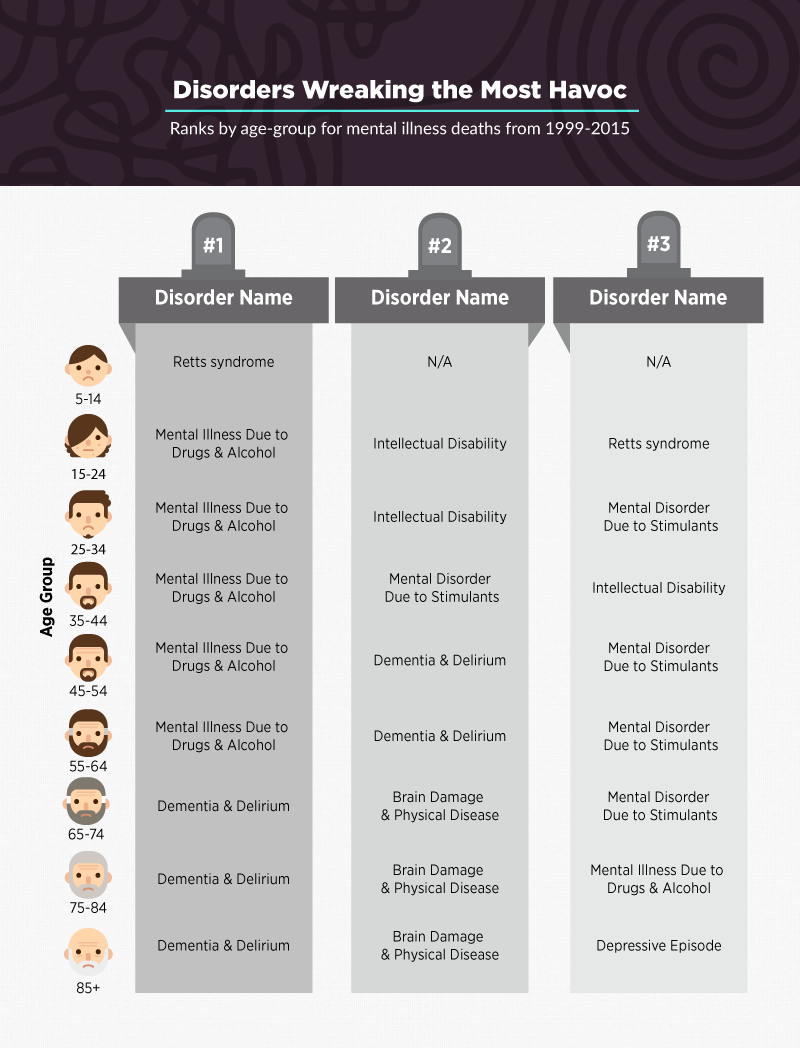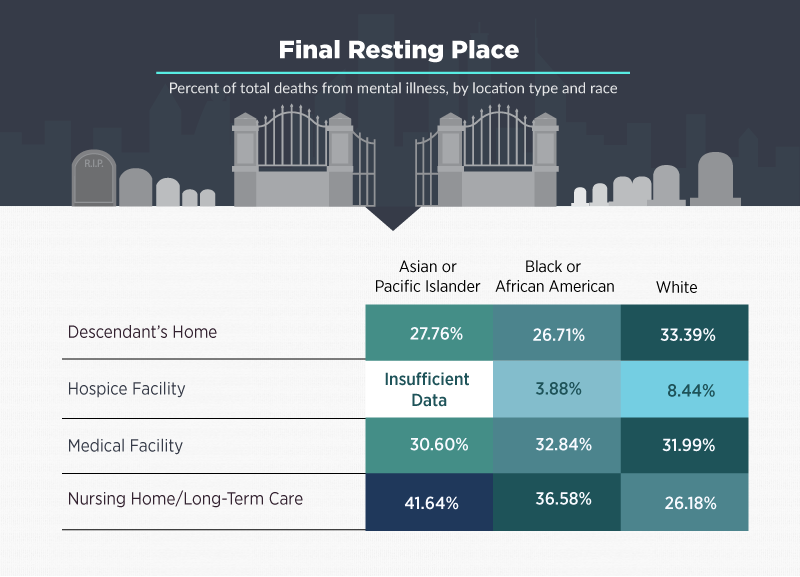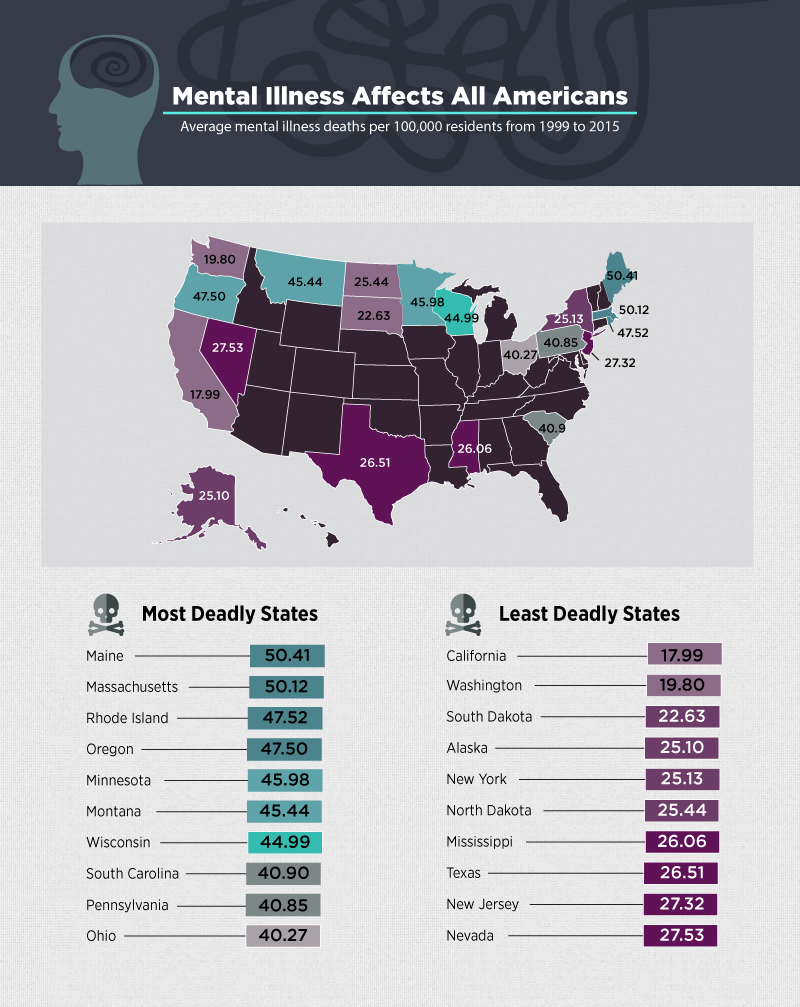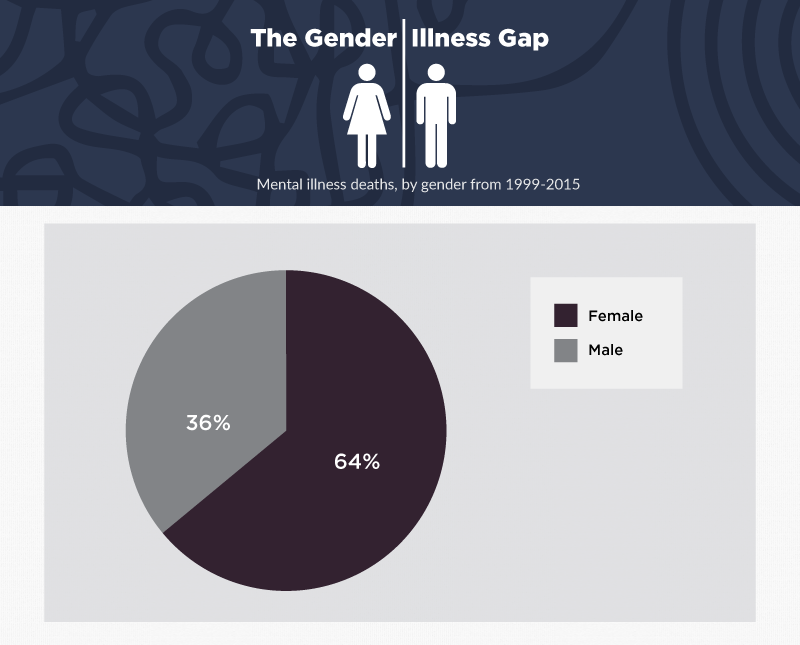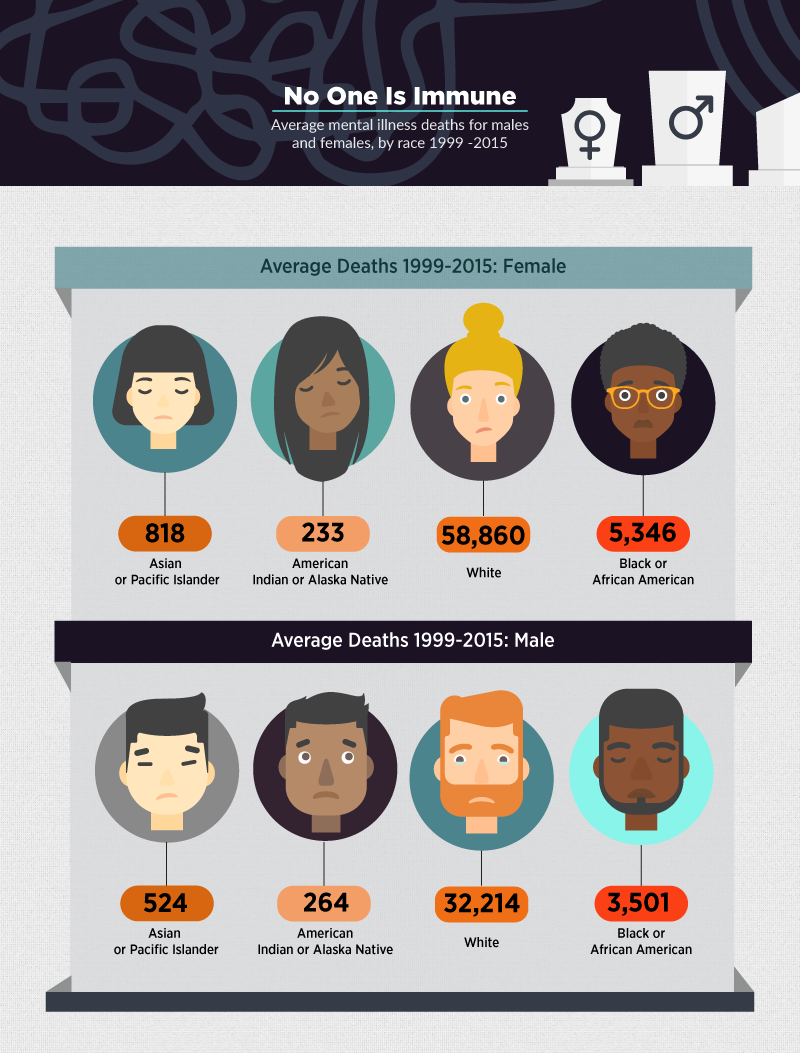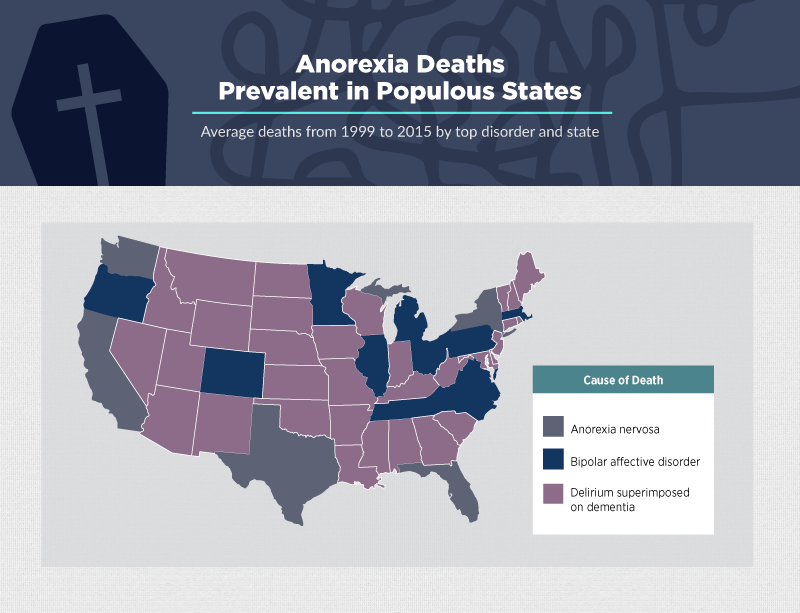
Any death is tragic, but losing a loved one to a potentially treatable mental health disorder can be particularly painful. According to the National Alliance on Mental Illness (NAMI), 1 in 5 Americans suffers from mental illness during any given year. Additionally, adults suffering from mental illness in the U.S. die an average of 25 years earlier compared with others, often due to treatable health conditions.
We decided to explore the link between mental illness and deaths among people in the U.S. Using mortality data collected by the U.S. Centers for Disease Control from 1999 to 2015, we visualized the deadliest mental health disorders, zooming in on the types of disorders, the most common locations of deaths, and how gender, race, and geographical location come into play. Read on for a snapshot of the devastating effects of mental illness.
Deadly Mental Disorders by Age
Among people in the U.S., several mental illnesses contribute to premature death. But among people aged 15 to 64, one cause, in particular, stands out as No. 1: drug- and alcohol-caused mental illness, which is further defined by both the CDC and ICD-10 coding system as the underlying cause of death based on one or more of the following: acute intoxication, harmful use, dependence syndrome, withdrawal state, withdrawal state with delirium, psychotic disorder, amnesic syndrome, residual and late-onset psychotic disorder, other mental and behavioral disorders attributed to drug or alcohol use, and unspecified mental and behavioral disorder attributed to drug or alcohol use. These are ICD-10 codes F10-F19. According to the National Institute on Drug Abuse, 1 in 4 deaths in the U.S. is attributed to alcohol, tobacco, or illicit or prescription drug use. While it’s been proven that treatment is effective, relatively few people with substance use disorders are provided access to the care they need.
Younger and older Americans are more likely to suffer from deaths caused by other mental illnesses. Rett syndrome—a rare genetic disorder that impacts brain development—is the deadliest mental health disorder for children under 15. This disorder, which currently has no cure, is also the third most common mental illness–caused death among those aged 15 to 24. For adults aged 64 and older, dementia and delirium are the mental disorders likely to cause death.
Intellectual disabilities are other likely contributing risk factors for the death of people aged 15 to 34. Mental disorders caused by stimulants are more common among middle-aged adults than for any other age group. Dementia and delirium are the No. 2 causes for those aged 45 to 64, while brain damage and physical disease are second-most likely for adults 65 and older.
Location of Deaths Caused by Mental Illness
Pondering the desired location in which to take your last breath is not an easy undertaking. However, it’s an important consideration. According to research by Stanford University, 8 in 10 Americans would prefer to die at home if possible. Unfortunately, the ideal way to go is not always reality. We broke down the CDC data by race and uncovered some intriguing results.
Among different races, 33 percent of those who identified as White/Caucasian succumbed to mental illness. In contrast, only 28 percent of Asian/Pacific Islanders and 27 percent of Black/African American people did the same.
Mental illness–caused deaths in medical facilities were comparatively common across the races we looked at, around 31 percent of Asians/Pacific Islanders, 33 percent of Black/African American people, and 32 percent of White/Caucasian people passed away in these settings.
Finally, we looked at people who died from mental illnesses in nursing homes or long-term care facilities. Around 42 percent of Asians/Pacific Islanders died in these facilities compared with 27 percent of Black/African American people and 26 percent of White/Caucasian people. Much lower proportions of the population succumbed to mental disorders in hospice; of those, White/Caucasian people were the largest segment of the population.
Deaths from Mental Illness Across the U.S.
You can extract some compelling insights by looking at more than 15 years of data regarding people who died from mental illnesses in various states. Maine is the top state for mental illness deaths per capita. The state has made headlines in recent years for Governor Paul LePage’s controversial actions regarding mental illness, including rejecting federal funding for a psychiatric facility and focusing on incarceration rather than treatment. Massachusetts follows closely, trailed just slightly by Rhode Island, Oregon, and Minnesota.
On the other end of the spectrum, the fewest deaths per capita related to mental health occurred in California, Washington, and South Dakota. While California’s mental health system has historically been fragmented across its 58 counties, the state has made strides. For instance, Sacramento recently opened a mental health urgent care clinic to offer “intermediate care” to people who aren’t sure where to go for treatment.
Mental Health Deaths by Sex
Among people who die from mental health disorders, there is a clear disparity in gender: 64 percent are women, compared with just under 36 percent who are men. Historically, women have fared worse than men when it comes to securing medical treatment. Studies have shown women are less likely to receive adequate medical treatment, and female patients are more likely to be perceived as “crying wolf”—hypochondriacs who may be lying about their pain. For dementia in particular, a UK study revealed women are less likely than men to get the proper care.
Mental Health Deaths by Race and Sex
When it comes to dying from mental health disorders, White/Caucasian women comprise the majority of deaths. Though the number of deaths of white men represent only around half of those of white women, White/Caucasian deaths still have a much higher number of deaths than other races. The death rates of white, middle-aged Americans have risen steadily over the years, in what researchers have termed “deaths of despair”: drugs, alcohol, and suicide. Researchers noted a correlation between these deaths and poor mental health, poor health, and reduced participation in the labor force.
On the other hand, American Indian/Alaska Native women experienced the fewest mental health deaths, followed by their male counterparts. Asian/Pacific Islander women and Asian/Pacific Islander men also had comparatively fewer deaths than people of other races. Interestingly, research reveals that Native American people are more likely to experience psychological distress and use drugs and alcohol at a younger age and at higher rates. However, Native Americans are also much more likely to turn to alternative therapies for mental health issues, such as seeking help from a spiritual healer rather than from other medical sources.
Mental Health Mortality Rates in the U.S.
Across the country, certain states emerge as leaders for deaths caused by specific mental health disorders. Delirium superimposed on dementia (diagnosed when delirium occurs simultaneously with pre-existing dementia) is the No. 1 mental health killer across much of the West, Midwest, and East.
According to the National Association of Anorexia Nervosa and Associated Disorders (ANAD), someone in the U.S. dies from an eating disorder every 52 minutes. Deaths from anorexia are more prevalent in New York, Florida, Texas, California, and Washington state.
Bipolar affective disorder—characterized by periods of deep and prolonged depression—is the largest threat in several states in the Eastern United States and a few states in the Midwest, as well as in Oregon and Colorado.
Seeking Treatment for Mental Health Disorders
For the tens of thousands of Americans dealing with mental health disorders, help may seem hard to come by. However, it is crucial to fight for the care you and your loved ones deserve. From eating disorders to substance-related disorders, genetic disorders to dementia and delirium, mental health problems touch people across the country every day. To learn more, visit us online at FHERehab.com today. It’s time to try something different – let us at FHE Health, a premier mental health and addiction treatment facility, lead the way.
Methodology
A data scrape was taken from Centers for Disease Control and Prevention, National Center for Health Statistics. Underlying Cause of Death, 1999-2015 on CDC WONDER Online Database, released December, 2016. Data are from the Multiple Cause of Death Files, 1999-2015, as compiled from data provided by the 57 vital statistics jurisdictions through the Vital Statistics Cooperative Program. Accessed at https://wonder.cdc.gov/ucd-icd10.html
Want to use our study?
Please feel free! All that we ask is that you include a link back to this page so readers can learn more about the study.
Sources
- https://www.nami.org/Learn-More/Mental-Health-By-the-Numbers
- https://www.drugabuse.gov/publications/health-consequences-drug-misuse/death
- https://www.mayoclinic.org/diseases-conditions/rett-syndrome/basics/definition/con-20028086
- https://palliative.stanford.edu/home-hospice-home-care-of-the-dying-patient/where-do-americans-die/
- https://www.pressherald.com/2016/02/10/seeking-to-pressure-lawmakers-lepage-vows-to-reject-federal-riverview-funds/
- https://bangordailynews.com/2016/02/20/health/from-hospitals-to-jails-how-maines-mentally-ill-are-still-institutionalized/
- https://www.latimes.com/local/california/la-me-mental-health–bills-20150413-story.html
- https://www.sacbee.com/news/local/health-and-medicine/article186072953.html
- https://www.theguardian.com/lifeandstyle/2017/nov/20/healthcare-gender-bias-women-pain
- https://www.telegraph.co.uk/news/2016/12/05/female-dementia-sufferers-get-worse-medical-treatment-men/
- https://www.npr.org/sections/health-shots/2017/03/23/521083335/the-forces-driving-middle-aged-white-peoples-deaths-of-despair
- https://www.ncbi.nlm.nih.gov/pmc/articles/PMC2247368/
- https://anad.org/get-informed/about-eating-disorders/eating-disorders-statistics/
- https://emedicine.medscape.com/article/286342-overview
